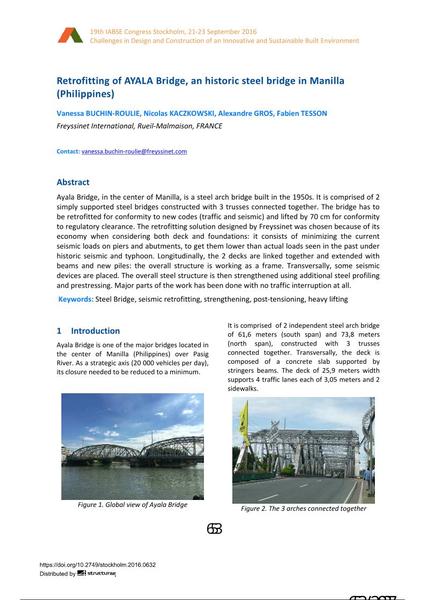Retrofitting of AYALA Bridge, an historic steel bridge in Manilla (Philippines)

|
|
|||||||||||
Bibliographic Details
| Author(s): |
Vanessa Buchin-Roulie
(Freyssinet International, Rueil-Malmaison, FRANCE)
Nicolas Kaczkowski (Freyssinet International, Rueil-Malmaison, FRANCE) Alexandre Gros (Freyssinet International, Rueil-Malmaison, FRANCE) Fabien Tesson (Freyssinet International, Rueil-Malmaison, FRANCE) |
||||
|---|---|---|---|---|---|
| Medium: | conference paper | ||||
| Language(s): | English | ||||
| Conference: | IABSE Congress: Challenges in Design and Construction of an Innovative and Sustainable Built Environment, Stockholm, Sweden, 21-23 September 2016 | ||||
| Published in: | IABSE Congress Stockholm, 2016 | ||||
|
|||||
| Page(s): | 653-659 | ||||
| Total no. of pages: | 7 | ||||
| Year: | 2016 | ||||
| DOI: | 10.2749/stockholm.2016.0632 | ||||
| Abstract: |
Ayala Bridge, in the center of Manilla, is a steel arch bridge built in the 1950s. It is comprised of 2 simply supported steel bridges constructed with 3 trusses connected together. The bridge has to be retrofitted for conformity to new codes (traffic and seismic) and lifted by 70 cm for conformity to regulatory clearance. The retrofitting solution designed by Freyssinet was chosen because of its economy when considering both deck and foundations: it consists of minimizing the current seismic loads on piers and abutments, to get them lower than actual loads seen in the past under historic seismic and typhoon. Longitudinally, the 2 decks are linked together and extended with beams and new piles: the overall structure is working as a frame. Transversally, some seismic devices are placed. The overall steel structure is then strengthened using additional steel profiling and prestressing. Major parts of the work has been done with no traffic interruption at all. |
||||
| Keywords: |
heavy lifting seismic retrofitting steel bridge strengthening post-tensioning
|
||||
